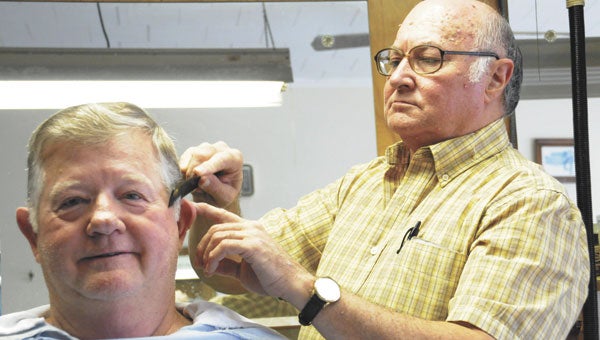Regulations for barbers?
Published 12:05 am Thursday, April 19, 2012
If a Maplesville representative has his way, local barber shops will soon be regulated, just like other cosmetology professions.
Alabama State Rep. Kurt Wallace last week introduced HB 664 to establish the Alabama Board of Barbering and Cosmetology.
The bill adds barbers to the cosmetology professions that are already regulated, including hair stylists, manicurists and estheticians.
“In Alabama, cosmetologist are strictly regulated while barbers are free to operate without any accountability,” Wallace said. “In a business where personal services are being administered, there is a duty to make those services safe and sanitary with the highest level of care.”
Alabama is currently the only state in the country that does not regulate barbers and they are not subject to inspections for sanitation or safety standards.
Additionally, there is no continuing education or training required for barbers.
However, cosmetologists, which is the second largest licensed profession in the state, are regulated by the Alabama Board of Cosmetology, which conducts regular inspection and requires professional education and training.
And local cosmetologists think it’s a great idea.
Oasis stylists Laurel York and Linda Cliburn said they hear about barbers doing everything they do, but without the regulations.
“For example, we can not longer use our duster brushes anymore,” York said. “If we use them, we can get written up.
“We always strive to get a 100,” she said of their annual inspection. “We are totally in support of (the proposed legislation). I was checking with someone the other day, and I think anyone can be a barber, with no experience.”
York and Cliburn said they are required every two years to pay $80 for re-licensing, and they must work on continuing education, which keeps them abreast of the latest rules and regulations, as well as new styles.
Cosmetology and esthetics apprentices must complete 3,000 hours of training within a three-year period, while nail apprentice must complete 1,200 hours.
Cosmetology and esthetics students must complete 1,500 hours of training, while nail students must complete 750 hours of training.
Once training is completed students and apprentices have 90 days to complete an exam.
Lurleen B. Wallace Community College Cosmetic Arts Instructor Denise Sauls said is in favor of the measure.
“I think that it is a wonderful idea to regulate barbers,” she said. “This is an extremely popular topic and has been for many years. I believe it would be beneficial to both the cosmetologist and the barbers if barbers were regulated by a board. However, there has always been some sort of road block each time this topic has been put on the agenda. It will be interesting to see if it actually makes it to the top this time.”
Paul Owens, owner of Andalusia Barber shop thinks the bill would decrease the number of men barbers.
“You see more women barbers around now. I think a lot of men probably – I don’t know this for sure – I’m thinking that’s what it is, a lot of men to go and take barber school. I hadn’t talked to any school officials. I had heard a while back that they had combined (the classes). I don’t know why.”
Owens attended Barber school at MacArthur, where he graduated in 1972.
“I’ve been cutting off and on ever since,” he said. “I have a city license and two state license at the business.”
Cory Brown, executive director of the Cosmetology Industry Association of Alabama is in support of the measure.
“Our members believe what’s good for the goose is good for the gander,” he said. “Barbers and cosmetologists should be operating under the same guidelines and restrictions to protect consumers, especially since many barbers provide the same services cosmetologist do.”
The bill must still pass the boards, actions and commissions committee before going to the House for vote.






